2025年人教版英语中考一轮复习八年级下册(Units 1-2 )(含答案)
文档属性
| 名称 | 2025年人教版英语中考一轮复习八年级下册(Units 1-2 )(含答案) | 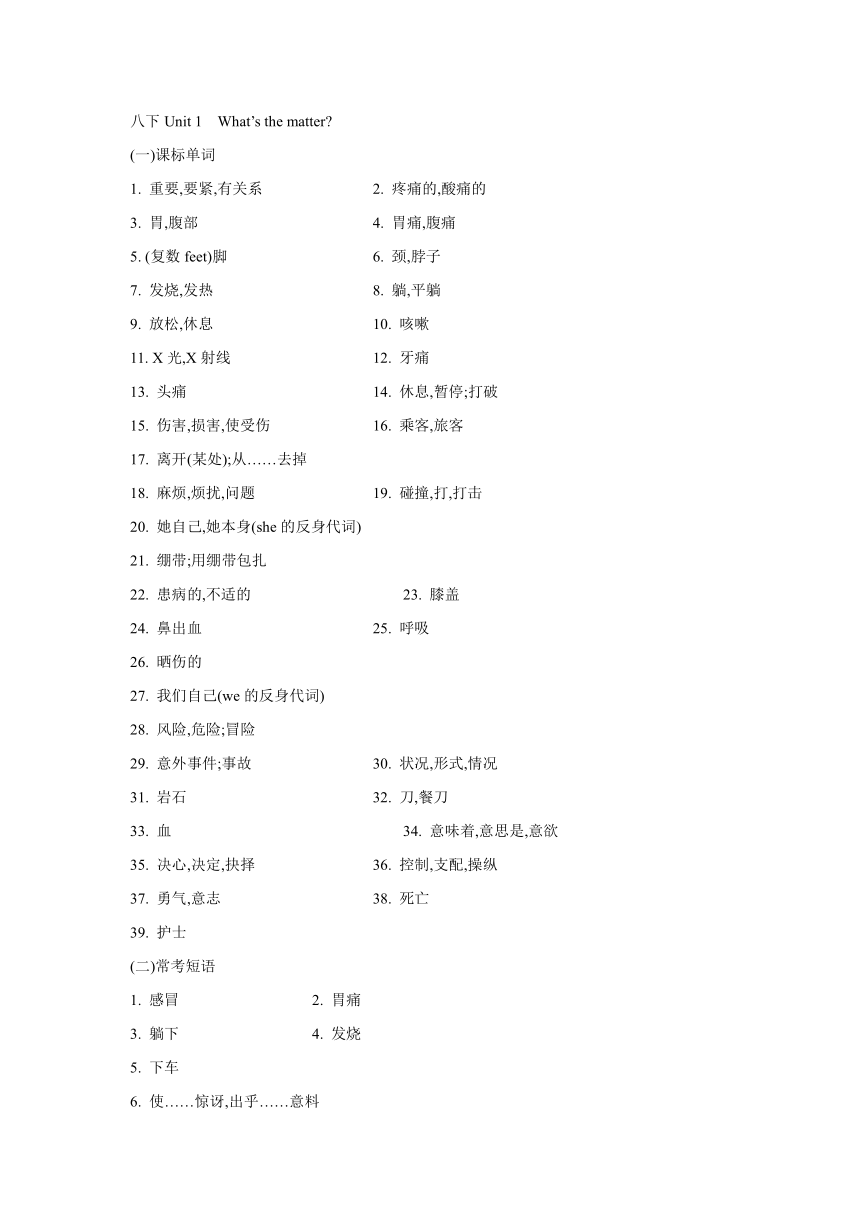 | |
| 格式 | docx | ||
| 文件大小 | 38.4KB | ||
| 资源类型 | 教案 | ||
| 版本资源 | 人教版 | ||
| 科目 | 英语 | ||
| 更新时间 | 2025-02-12 19:50:48 | ||
图片预览

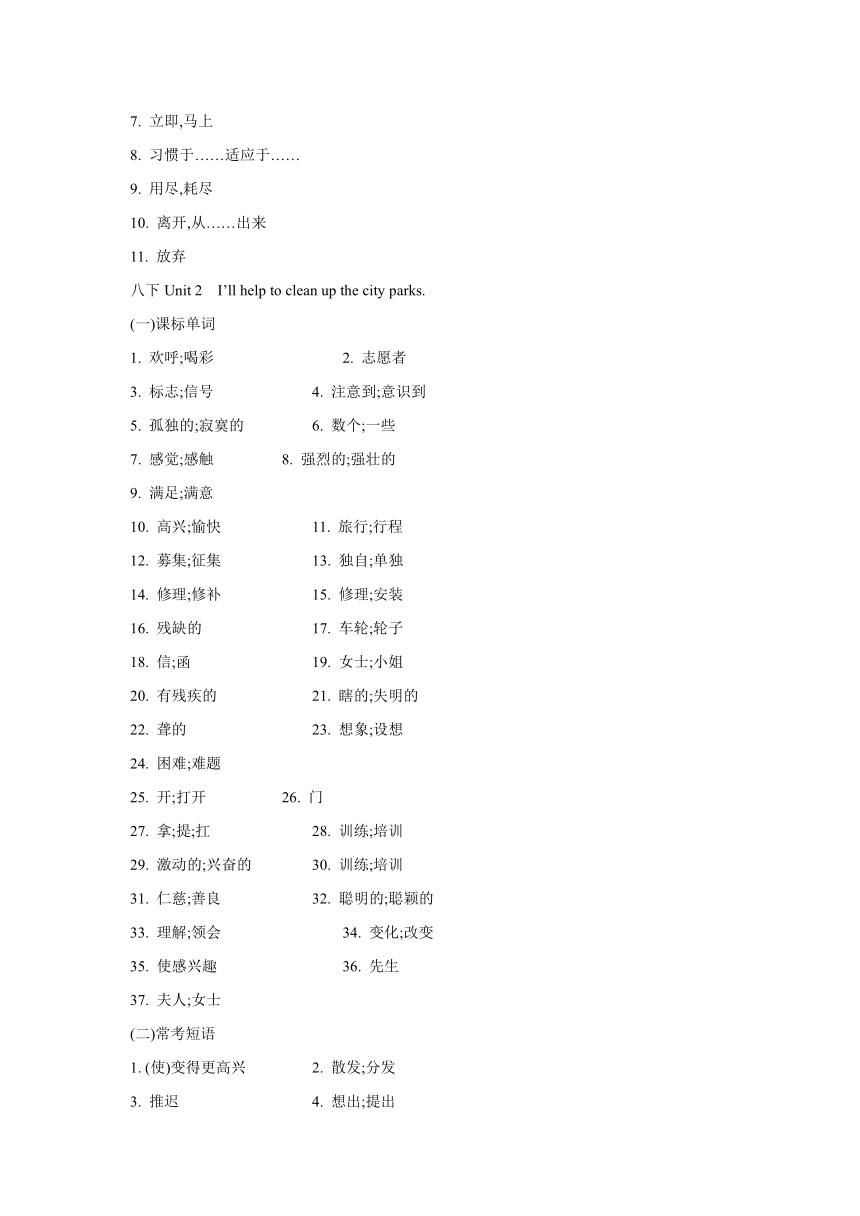
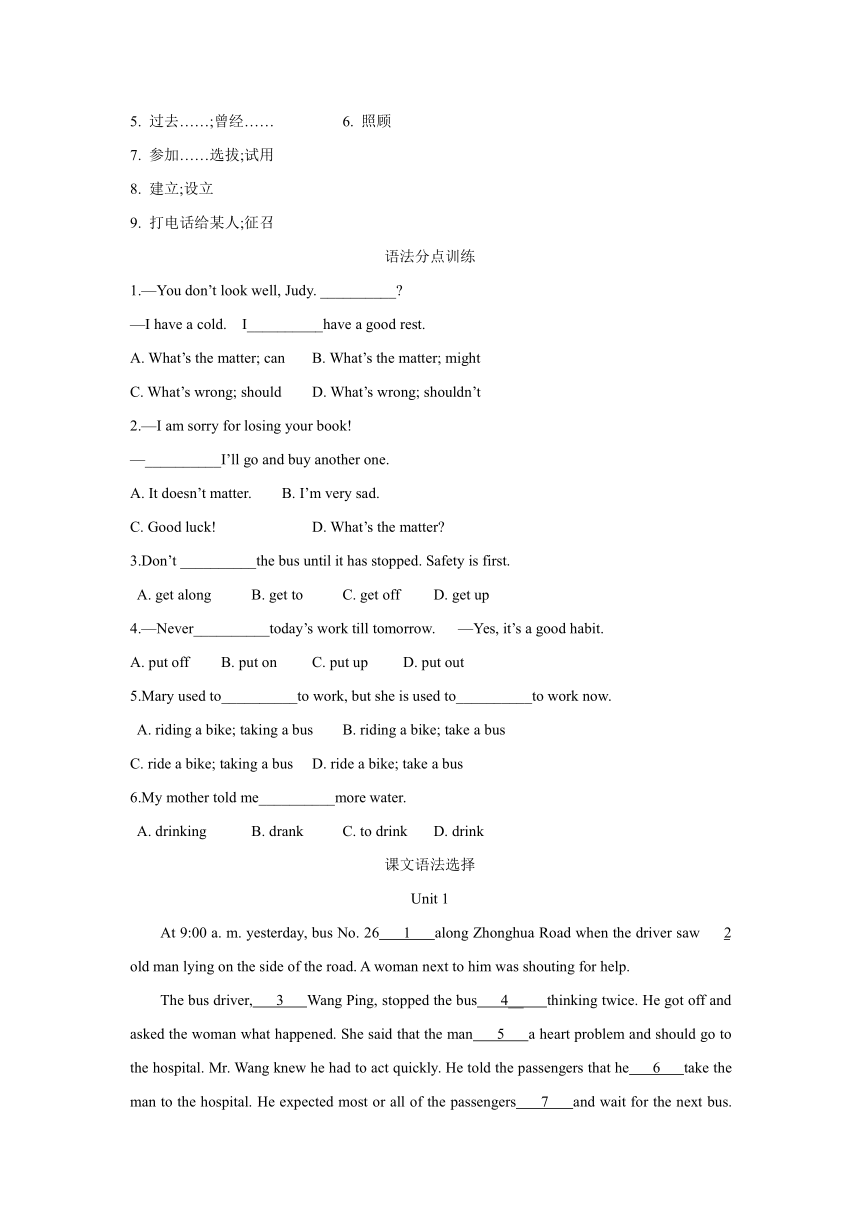
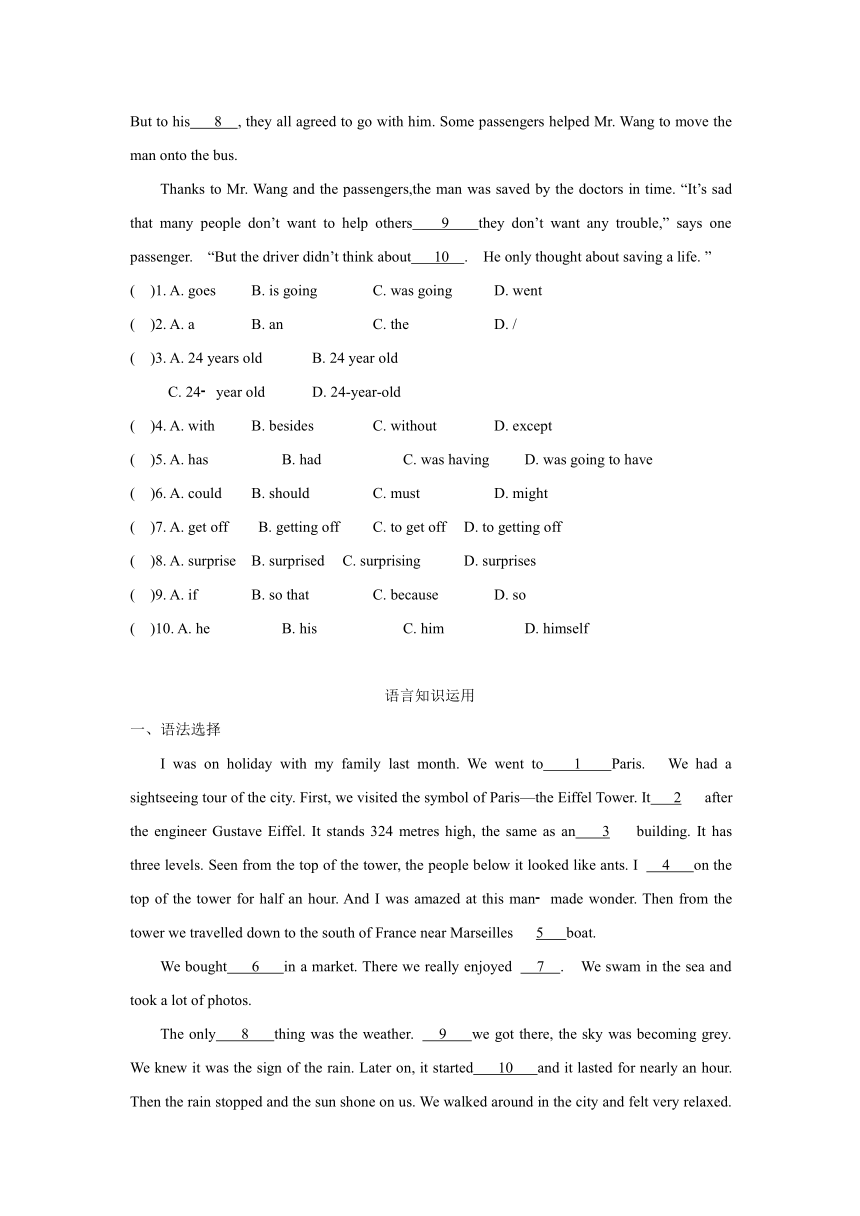
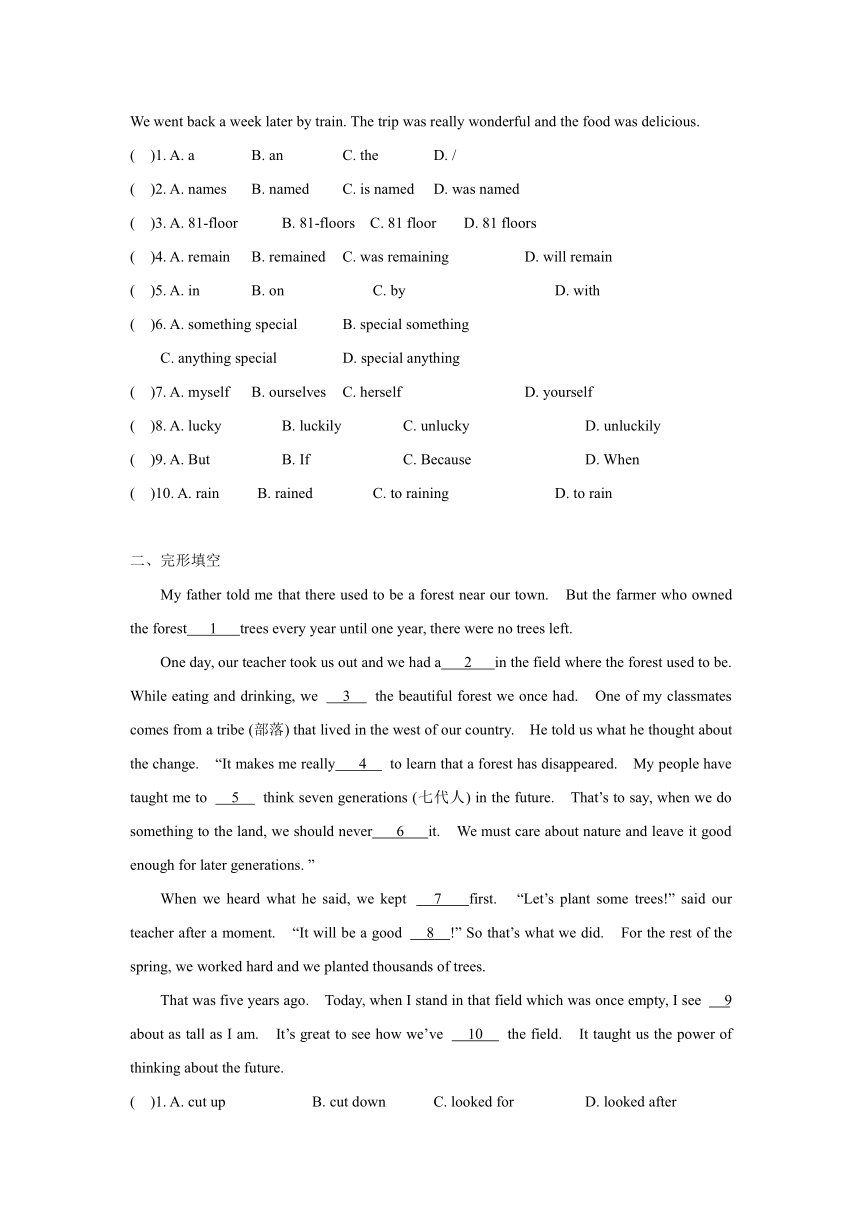
文档简介
八下Unit 1 What’s the matter
(一)课标单词
1. 重要,要紧,有关系 2. 疼痛的,酸痛的
3. 胃,腹部 4. 胃痛,腹痛
5. (复数feet)脚 6. 颈,脖子
7. 发烧,发热 8. 躺,平躺
9. 放松,休息 10. 咳嗽
11. X光,X射线 12. 牙痛
13. 头痛 14. 休息,暂停;打破
15. 伤害,损害,使受伤 16. 乘客,旅客
17. 离开(某处);从……去掉
18. 麻烦,烦扰,问题 19. 碰撞,打,打击
20. 她自己,她本身(she的反身代词)
21. 绷带;用绷带包扎
22. 患病的,不适的 23. 膝盖
24. 鼻出血 25. 呼吸
26. 晒伤的
27. 我们自己(we的反身代词)
28. 风险,危险;冒险
29. 意外事件;事故 30. 状况,形式,情况
31. 岩石 32. 刀,餐刀
33. 血 34. 意味着,意思是,意欲
35. 决心,决定,抉择 36. 控制,支配,操纵
37. 勇气,意志 38. 死亡
39. 护士
(二)常考短语
1. 感冒 2. 胃痛
3. 躺下 4. 发烧
5. 下车
6. 使……惊讶,出乎……意料
7. 立即,马上
8. 习惯于……适应于……
9. 用尽,耗尽
10. 离开,从……出来
11. 放弃
八下Unit 2 I’ll help to clean up the city parks.
(一)课标单词
1. 欢呼;喝彩 2. 志愿者
3. 标志;信号 4. 注意到;意识到
5. 孤独的;寂寞的 6. 数个;一些
7. 感觉;感触 8. 强烈的;强壮的
9. 满足;满意
10. 高兴;愉快 11. 旅行;行程
12. 募集;征集 13. 独自;单独
14. 修理;修补 15. 修理;安装
16. 残缺的 17. 车轮;轮子
18. 信;函 19. 女士;小姐
20. 有残疾的 21. 瞎的;失明的
22. 聋的 23. 想象;设想
24. 困难;难题
25. 开;打开 26. 门
27. 拿;提;扛 28. 训练;培训
29. 激动的;兴奋的 30. 训练;培训
31. 仁慈;善良 32. 聪明的;聪颖的
33. 理解;领会 34. 变化;改变
35. 使感兴趣 36. 先生
37. 夫人;女士
(二)常考短语
1. (使)变得更高兴 2. 散发;分发
3. 推迟 4. 想出;提出
5. 过去……;曾经…… 6. 照顾
7. 参加……选拔;试用
8. 建立;设立
9. 打电话给某人;征召
语法分点训练
1.—You don’t look well, Judy. __________
—I have a cold. I__________have a good rest.
A. What’s the matter; can B. What’s the matter; might
C. What’s wrong; should D. What’s wrong; shouldn’t
2.—I am sorry for losing your book!
—__________I’ll go and buy another one.
A. It doesn’t matter. B. I’m very sad.
C. Good luck! D. What’s the matter
3.Don’t __________the bus until it has stopped. Safety is first.
A. get along B. get to C. get off D. get up
4.—Never__________today’s work till tomorrow. —Yes, it’s a good habit.
A. put off B. put on C. put up D. put out
5.Mary used to__________to work, but she is used to__________to work now.
A. riding a bike; taking a bus B. riding a bike; take a bus
C. ride a bike; taking a bus D. ride a bike; take a bus
6.My mother told me__________more water.
A. drinking B. drank C. to drink D. drink
课文语法选择
Unit 1
At 9:00 a. m. yesterday, bus No. 26 1 along Zhonghua Road when the driver saw 2 old man lying on the side of the road. A woman next to him was shouting for help.
The bus driver, 3 Wang Ping, stopped the bus 4__ thinking twice. He got off and asked the woman what happened. She said that the man 5 a heart problem and should go to the hospital. Mr. Wang knew he had to act quickly. He told the passengers that he 6 take the man to the hospital. He expected most or all of the passengers 7 and wait for the next bus. But to his 8 , they all agreed to go with him. Some passengers helped Mr. Wang to move the man onto the bus.
Thanks to Mr. Wang and the passengers,the man was saved by the doctors in time. “It’s sad that many people don’t want to help others 9 they don’t want any trouble,” says one passenger. “But the driver didn’t think about 10 . He only thought about saving a life. ”
( )1. A. goes B. is going C. was going D. went
( )2. A. a B. an C. the D. /
( )3. A. 24 years old B. 24 year old
C. 24 year old D. 24-year-old
( )4. A. with B. besides C. without D. except
( )5. A. has B. had C. was having D. was going to have
( )6. A. could B. should C. must D. might
( )7. A. get off B. getting off C. to get off D. to getting off
( )8. A. surprise B. surprised C. surprising D. surprises
( )9. A. if B. so that C. because D. so
( )10. A. he B. his C. him D. himself
语言知识运用
一、语法选择
I was on holiday with my family last month. We went to 1 Paris. We had a sightseeing tour of the city. First, we visited the symbol of Paris—the Eiffel Tower. It 2 after the engineer Gustave Eiffel. It stands 324 metres high, the same as an 3 building. It has three levels. Seen from the top of the tower, the people below it looked like ants. I 4 on the top of the tower for half an hour. And I was amazed at this man made wonder. Then from the tower we travelled down to the south of France near Marseilles 5 boat.
We bought 6 in a market. There we really enjoyed 7 . We swam in the sea and took a lot of photos.
The only 8 thing was the weather. 9 we got there, the sky was becoming grey. We knew it was the sign of the rain. Later on, it started 10 and it lasted for nearly an hour. Then the rain stopped and the sun shone on us. We walked around in the city and felt very relaxed. We went back a week later by train. The trip was really wonderful and the food was delicious.
( )1. A. a B. an C. the D. /
( )2. A. names B. named C. is named D. was named
( )3. A. 81-floor B. 81-floors C. 81 floor D. 81 floors
( )4. A. remain B. remained C. was remaining D. will remain
( )5. A. in B. on C. by D. with
( )6. A. something special B. special something
C. anything special D. special anything
( )7. A. myself B. ourselves C. herself D. yourself
( )8. A. lucky B. luckily C. unlucky D. unluckily
( )9. A. But B. If C. Because D. When
( )10. A. rain B. rained C. to raining D. to rain
二、完形填空
My father told me that there used to be a forest near our town. But the farmer who owned the forest 1 trees every year until one year, there were no trees left.
One day, our teacher took us out and we had a 2 in the field where the forest used to be. While eating and drinking, we 3 the beautiful forest we once had. One of my classmates comes from a tribe (部落) that lived in the west of our country. He told us what he thought about the change. “It makes me really 4 to learn that a forest has disappeared. My people have taught me to 5 think seven generations (七代人) in the future. That’s to say, when we do something to the land, we should never 6 it. We must care about nature and leave it good enough for later generations. ”
When we heard what he said, we kept 7 first. “Let’s plant some trees!” said our teacher after a moment. “It will be a good 8 !” So that’s what we did. For the rest of the spring, we worked hard and we planted thousands of trees.
That was five years ago. Today, when I stand in that field which was once empty, I see 9 about as tall as I am. It’s great to see how we’ve 10 the field. It taught us the power of thinking about the future.
( )1. A. cut up B. cut down C. looked for D. looked after
( )2. A. picnic B. test C. wish D. lesson
( )3. A. thought about B. worried about C. set about D. talked about
( )4. A. tired B. excited C. sad D. hopeful
( )5. A. sometimes B. always C. seldom D. never
( )6. A. protect B. hurt C. study D. sell
( )7. A. thankful B. happy C. silent D. shy
( )8. A. start B. mistake C. mess D. warning
( )9. A. trees B. leaves C. grass D. flowers
( )10. A. broken B. bought C. wasted D. changed
三、 短文填空
In April 2019,lots of bags full of small change were seen at bus stops in Tianjin. They were made for 1. __________to turn their notes into small change. And such
2. __________idea came from four students from Zhongbei Middle School,Tianjin.
“People will surely feel 3. __________ when they take a bus without coins. We just want to do 4. __________to help them,” said Wang Yongcun,15,one of the four students.
The four boys 5. __________ their whole weekend making the change bags. After that they went to see the number of the passengers at each bus stop near their school,and then 6. __________the top six stops to put the bags.
Many people think that the four boys have really done a good job. But,things didn’t go as the boys thought. Two days 7. __________,they found that the money was gone,and that even the bags were taken. It really made them sad but they would not give 8. __________. Their classmates and teachers came to help them in time. They put their pocket 9. __________in bags again. And the teachers also taught them to make better change bags. They tried their best to do it.
The four boys feel very happy 10. __________they have done something good for the passengers. Their warm hearts are moving. More and more people are beginning to join in the activity.
Unit 1 词汇及短语答案
(一)课标单词
1. matter 2. sore 3. stomach 4. stomachache 5. foot
6. neck 7. fever 8. lie 9. relax 10. cough
11. X – ray 12. toothache 13. headache 14. break 15. hurt
16. passenger 17. off 18. trouble 19. hit 20. herself
21. bandage 22. sick 23. knee 24. nosebleed 25. breathe
26. sunburned 27. ourselves 28. risk 29. accident 30. situation
31. rock 32. knife 33. blood 34. mean 35. decision
36. control 37. spirit 38. death 39. nurse
(二)常考短语
1. have a cold 2. have a stomachache
3. lie down 4. have a fever
5. get off 6. to one's surprise
7. right away 8. be used to
9. run out (of) 10. get out of
11. give up
Unit 2 词汇及短语答案
(一)课标单词
1. cheer 2. volunteer 3. sign 4. notice 5. lonely
6. several 7. feeling 8. strong 9. satisfaction 10. joy
11. journey 12. raise 13. alone 14. repair 15. fix
16. broken 17. wheel 18. letter 19. Miss 20. disabled
21. blind 22. deaf 23. imagine 24. difficulty 25. open
26. door 27. carry 28. train 29. excited 30. training
31. kindness 32. clever 33. understand 34. change
35. interest 36. sir 37. madam
(二)常考短语
1. cheer up
2. give out
3. put off
4. come up with
5. used to
6. care for
7. try out
8. set up
9. call up
语法分点训练
答案:C
解析:询问对方 “怎么了” 常用 What’s the matter 或 What’s wrong 回答 “我感冒了”,应该是 “我应该好好休息”,should 表示 “应该”,所以选 C。
答案:A
解析:对方说 “弄丢你的书很抱歉”,A 选项 “没关系” 符合语境;B 选项 “我很伤心”;C 选项 “祝你好运”;D 选项 “怎么了” 均不符合。
答案:C
解析:get along“相处,进展”;get to “到达”;get off “下车”;get up “起床”。根据 “直到车停了” 可知是 “不要下车”,选 C。
答案:A
解析:put off “推迟”;put on “穿上”;put up“张贴,搭建”;put out “扑灭”。根据语境 “不要把今天的工作推迟到明天”,选 A。
答案:C
解析:used to do sth. “过去常常做某事”;be used to doing sth. “习惯于做某事”。第一空 “玛丽过去常常骑自行车去上班” 用 ride a bike;第二空 “她现在习惯坐公交车去上班” 用 taking a bus,选 C。
答案:C
解析:tell sb. to do sth. “告诉某人做某事”,所以用 to drink,选 C。
课文语法选择
答案:C
解析:根据 “at 9:00 a.m. yesterday” 可知用过去进行时,结构为 was/were + doing,主语 bus No. 26 是单数,所以用 was going,选 C。
答案:B
解析:“一位老人” 表示泛指,old 以元音音素开头,用 an,选 B。
答案:D
解析:“24 岁的” 作定语修饰 driver,用 24 - year - old,有连字符,名词用单数,选 D。
答案:C
解析:根据语境 “毫不犹豫地停下了车”,without “没有”,选 C。
答案:B
解析:and 连接并列谓语,前后时态一致,后面 should 是过去式,所以前面也用一般过去时 had,选 B。
答案:C
解析:根据上文 “他知道必须迅速行动”,可知这里是 “他必须送这个人去医院”,must “必须”,选 C。
答案:C
解析:expect sb. to do sth. “期望某人做某事”,所以用 to get off,选 C。
答案:A
解析:to one’s surprise “令某人惊讶的是”,用名词 surprise,选 A。
答案:C
解析:“很多人不想帮助别人” 是因为 “他们不想有任何麻烦”,because “因为” 引导原因状语从句,选 C。
答案:D
解析:根据语境 “司机没有考虑他自己”,用反身代词 himself,选 D。
语言知识运用
语法选择
答案:D
解析:“去巴黎”,城市名前不用冠词,选 D。
答案:D
解析:根据语境 “它是以工程师古斯塔夫 埃菲尔命名的”,用一般过去时的被动语态 was named,选 D。
答案:A
解析:“一座 81 层的建筑”,用 81 - floor,有连字符,名词用单数,选 A。
答案:B
解析:根据上下文可知用一般过去时,remain 的过去式是 remained,选 B。
答案:C
解析:“乘船” 用 by boat,选 C。
答案:A
解析:肯定句中用 something,形容词修饰不定代词要后置,所以是 something special,选 A。
答案:B
解析:enjoy oneself “玩得开心”,主语是 we,所以用 ourselves,选 B。
答案:C
解析:根据下文 “天气不好”,可知是 “不幸的事情”,unlucky “不幸的”,选 C。
答案:D
解析:根据语境 “当我们到达那里时,天空变得灰暗”,when“当…… 时候”,选 D。
答案:D
解析:start to do sth. “开始做某事”,选 D。
完形填空
答案:B
解析:cut up “切碎”;cut down “砍伐”;look for “寻找”;look after “照顾”。根据 “直到没有树剩下” 可知是 “砍伐树木”,选 B。
答案:A
解析:根据 “在野外吃喝” 可知是 “野餐”,have a picnic,选 A。
答案:D
解析:think about “考虑”;worry about “担心”;set about “着手做”;talk about “谈论”。根据语境是 “我们谈论曾经拥有的美丽森林”,选 D。
答案:C
解析:根据 “森林消失了” 可知是 “让我很伤心”,sad “伤心的”,选 C。
答案:B
解析:根据语境 “我的族人教导我总是要考虑未来七代人”,always “总是”,选 B。
答案:B
解析:protect “保护”;hurt “伤害”;study “学习”;sell “卖”。根据 “我们必须关心自然” 可知是 “不要伤害它”,选 B。
答案:C
解析:根据下文老师说的话,可知我们先是 “保持沉默”,silent “沉默的”,选 C。
答案:A
解析:根据 “我们种树” 可知是 “这将是一个好的开始”,start “开始”,选 A。
答案:A
解析:根据上文 “我们种了树”,可知现在看到 “树和我一样高了”,选 A。
答案:D
解析:根据语境 “看到我们如何改变了这片土地,真是太棒了”,change “改变”,选 D。
短文填空
passengers
解析:根据语境 “这些袋子是为乘客把纸币换成零钱准备的”,for 后用名词复数 passengers。
an
解析:“一个想法”,idea 以元音音素开头,用 an。
uncomfortable
解析:根据 “坐公交车没有硬币” 可知是 “感到不舒服”,用形容词 uncomfortable。
something
解析:根据语境 “我们只是想做点事情帮助他们”,肯定句用 something。
spent
解析:spend... (in) doing sth. “花费…… 做某事”,根据上下文用一般过去时,spend 的过去式是 spent。
chose
解析:根据语境 “选择了前六个站点放袋子”,用一般过去时,choose 的过去式是 chose。
later
解析:“两天后” 用 two days later。
up
解析:give up “放弃”,符合语境。
money
解析:根据上文 “钱不见了”,可知这里是 “把零花钱又放进袋子里”,pocket money “零花钱”。
because
解析:“他们为乘客做了好事” 是 “他们感到开心” 的原因,用 because 引导原因状语从句。
(一)课标单词
1. 重要,要紧,有关系 2. 疼痛的,酸痛的
3. 胃,腹部 4. 胃痛,腹痛
5. (复数feet)脚 6. 颈,脖子
7. 发烧,发热 8. 躺,平躺
9. 放松,休息 10. 咳嗽
11. X光,X射线 12. 牙痛
13. 头痛 14. 休息,暂停;打破
15. 伤害,损害,使受伤 16. 乘客,旅客
17. 离开(某处);从……去掉
18. 麻烦,烦扰,问题 19. 碰撞,打,打击
20. 她自己,她本身(she的反身代词)
21. 绷带;用绷带包扎
22. 患病的,不适的 23. 膝盖
24. 鼻出血 25. 呼吸
26. 晒伤的
27. 我们自己(we的反身代词)
28. 风险,危险;冒险
29. 意外事件;事故 30. 状况,形式,情况
31. 岩石 32. 刀,餐刀
33. 血 34. 意味着,意思是,意欲
35. 决心,决定,抉择 36. 控制,支配,操纵
37. 勇气,意志 38. 死亡
39. 护士
(二)常考短语
1. 感冒 2. 胃痛
3. 躺下 4. 发烧
5. 下车
6. 使……惊讶,出乎……意料
7. 立即,马上
8. 习惯于……适应于……
9. 用尽,耗尽
10. 离开,从……出来
11. 放弃
八下Unit 2 I’ll help to clean up the city parks.
(一)课标单词
1. 欢呼;喝彩 2. 志愿者
3. 标志;信号 4. 注意到;意识到
5. 孤独的;寂寞的 6. 数个;一些
7. 感觉;感触 8. 强烈的;强壮的
9. 满足;满意
10. 高兴;愉快 11. 旅行;行程
12. 募集;征集 13. 独自;单独
14. 修理;修补 15. 修理;安装
16. 残缺的 17. 车轮;轮子
18. 信;函 19. 女士;小姐
20. 有残疾的 21. 瞎的;失明的
22. 聋的 23. 想象;设想
24. 困难;难题
25. 开;打开 26. 门
27. 拿;提;扛 28. 训练;培训
29. 激动的;兴奋的 30. 训练;培训
31. 仁慈;善良 32. 聪明的;聪颖的
33. 理解;领会 34. 变化;改变
35. 使感兴趣 36. 先生
37. 夫人;女士
(二)常考短语
1. (使)变得更高兴 2. 散发;分发
3. 推迟 4. 想出;提出
5. 过去……;曾经…… 6. 照顾
7. 参加……选拔;试用
8. 建立;设立
9. 打电话给某人;征召
语法分点训练
1.—You don’t look well, Judy. __________
—I have a cold. I__________have a good rest.
A. What’s the matter; can B. What’s the matter; might
C. What’s wrong; should D. What’s wrong; shouldn’t
2.—I am sorry for losing your book!
—__________I’ll go and buy another one.
A. It doesn’t matter. B. I’m very sad.
C. Good luck! D. What’s the matter
3.Don’t __________the bus until it has stopped. Safety is first.
A. get along B. get to C. get off D. get up
4.—Never__________today’s work till tomorrow. —Yes, it’s a good habit.
A. put off B. put on C. put up D. put out
5.Mary used to__________to work, but she is used to__________to work now.
A. riding a bike; taking a bus B. riding a bike; take a bus
C. ride a bike; taking a bus D. ride a bike; take a bus
6.My mother told me__________more water.
A. drinking B. drank C. to drink D. drink
课文语法选择
Unit 1
At 9:00 a. m. yesterday, bus No. 26 1 along Zhonghua Road when the driver saw 2 old man lying on the side of the road. A woman next to him was shouting for help.
The bus driver, 3 Wang Ping, stopped the bus 4__ thinking twice. He got off and asked the woman what happened. She said that the man 5 a heart problem and should go to the hospital. Mr. Wang knew he had to act quickly. He told the passengers that he 6 take the man to the hospital. He expected most or all of the passengers 7 and wait for the next bus. But to his 8 , they all agreed to go with him. Some passengers helped Mr. Wang to move the man onto the bus.
Thanks to Mr. Wang and the passengers,the man was saved by the doctors in time. “It’s sad that many people don’t want to help others 9 they don’t want any trouble,” says one passenger. “But the driver didn’t think about 10 . He only thought about saving a life. ”
( )1. A. goes B. is going C. was going D. went
( )2. A. a B. an C. the D. /
( )3. A. 24 years old B. 24 year old
C. 24 year old D. 24-year-old
( )4. A. with B. besides C. without D. except
( )5. A. has B. had C. was having D. was going to have
( )6. A. could B. should C. must D. might
( )7. A. get off B. getting off C. to get off D. to getting off
( )8. A. surprise B. surprised C. surprising D. surprises
( )9. A. if B. so that C. because D. so
( )10. A. he B. his C. him D. himself
语言知识运用
一、语法选择
I was on holiday with my family last month. We went to 1 Paris. We had a sightseeing tour of the city. First, we visited the symbol of Paris—the Eiffel Tower. It 2 after the engineer Gustave Eiffel. It stands 324 metres high, the same as an 3 building. It has three levels. Seen from the top of the tower, the people below it looked like ants. I 4 on the top of the tower for half an hour. And I was amazed at this man made wonder. Then from the tower we travelled down to the south of France near Marseilles 5 boat.
We bought 6 in a market. There we really enjoyed 7 . We swam in the sea and took a lot of photos.
The only 8 thing was the weather. 9 we got there, the sky was becoming grey. We knew it was the sign of the rain. Later on, it started 10 and it lasted for nearly an hour. Then the rain stopped and the sun shone on us. We walked around in the city and felt very relaxed. We went back a week later by train. The trip was really wonderful and the food was delicious.
( )1. A. a B. an C. the D. /
( )2. A. names B. named C. is named D. was named
( )3. A. 81-floor B. 81-floors C. 81 floor D. 81 floors
( )4. A. remain B. remained C. was remaining D. will remain
( )5. A. in B. on C. by D. with
( )6. A. something special B. special something
C. anything special D. special anything
( )7. A. myself B. ourselves C. herself D. yourself
( )8. A. lucky B. luckily C. unlucky D. unluckily
( )9. A. But B. If C. Because D. When
( )10. A. rain B. rained C. to raining D. to rain
二、完形填空
My father told me that there used to be a forest near our town. But the farmer who owned the forest 1 trees every year until one year, there were no trees left.
One day, our teacher took us out and we had a 2 in the field where the forest used to be. While eating and drinking, we 3 the beautiful forest we once had. One of my classmates comes from a tribe (部落) that lived in the west of our country. He told us what he thought about the change. “It makes me really 4 to learn that a forest has disappeared. My people have taught me to 5 think seven generations (七代人) in the future. That’s to say, when we do something to the land, we should never 6 it. We must care about nature and leave it good enough for later generations. ”
When we heard what he said, we kept 7 first. “Let’s plant some trees!” said our teacher after a moment. “It will be a good 8 !” So that’s what we did. For the rest of the spring, we worked hard and we planted thousands of trees.
That was five years ago. Today, when I stand in that field which was once empty, I see 9 about as tall as I am. It’s great to see how we’ve 10 the field. It taught us the power of thinking about the future.
( )1. A. cut up B. cut down C. looked for D. looked after
( )2. A. picnic B. test C. wish D. lesson
( )3. A. thought about B. worried about C. set about D. talked about
( )4. A. tired B. excited C. sad D. hopeful
( )5. A. sometimes B. always C. seldom D. never
( )6. A. protect B. hurt C. study D. sell
( )7. A. thankful B. happy C. silent D. shy
( )8. A. start B. mistake C. mess D. warning
( )9. A. trees B. leaves C. grass D. flowers
( )10. A. broken B. bought C. wasted D. changed
三、 短文填空
In April 2019,lots of bags full of small change were seen at bus stops in Tianjin. They were made for 1. __________to turn their notes into small change. And such
2. __________idea came from four students from Zhongbei Middle School,Tianjin.
“People will surely feel 3. __________ when they take a bus without coins. We just want to do 4. __________to help them,” said Wang Yongcun,15,one of the four students.
The four boys 5. __________ their whole weekend making the change bags. After that they went to see the number of the passengers at each bus stop near their school,and then 6. __________the top six stops to put the bags.
Many people think that the four boys have really done a good job. But,things didn’t go as the boys thought. Two days 7. __________,they found that the money was gone,and that even the bags were taken. It really made them sad but they would not give 8. __________. Their classmates and teachers came to help them in time. They put their pocket 9. __________in bags again. And the teachers also taught them to make better change bags. They tried their best to do it.
The four boys feel very happy 10. __________they have done something good for the passengers. Their warm hearts are moving. More and more people are beginning to join in the activity.
Unit 1 词汇及短语答案
(一)课标单词
1. matter 2. sore 3. stomach 4. stomachache 5. foot
6. neck 7. fever 8. lie 9. relax 10. cough
11. X – ray 12. toothache 13. headache 14. break 15. hurt
16. passenger 17. off 18. trouble 19. hit 20. herself
21. bandage 22. sick 23. knee 24. nosebleed 25. breathe
26. sunburned 27. ourselves 28. risk 29. accident 30. situation
31. rock 32. knife 33. blood 34. mean 35. decision
36. control 37. spirit 38. death 39. nurse
(二)常考短语
1. have a cold 2. have a stomachache
3. lie down 4. have a fever
5. get off 6. to one's surprise
7. right away 8. be used to
9. run out (of) 10. get out of
11. give up
Unit 2 词汇及短语答案
(一)课标单词
1. cheer 2. volunteer 3. sign 4. notice 5. lonely
6. several 7. feeling 8. strong 9. satisfaction 10. joy
11. journey 12. raise 13. alone 14. repair 15. fix
16. broken 17. wheel 18. letter 19. Miss 20. disabled
21. blind 22. deaf 23. imagine 24. difficulty 25. open
26. door 27. carry 28. train 29. excited 30. training
31. kindness 32. clever 33. understand 34. change
35. interest 36. sir 37. madam
(二)常考短语
1. cheer up
2. give out
3. put off
4. come up with
5. used to
6. care for
7. try out
8. set up
9. call up
语法分点训练
答案:C
解析:询问对方 “怎么了” 常用 What’s the matter 或 What’s wrong 回答 “我感冒了”,应该是 “我应该好好休息”,should 表示 “应该”,所以选 C。
答案:A
解析:对方说 “弄丢你的书很抱歉”,A 选项 “没关系” 符合语境;B 选项 “我很伤心”;C 选项 “祝你好运”;D 选项 “怎么了” 均不符合。
答案:C
解析:get along“相处,进展”;get to “到达”;get off “下车”;get up “起床”。根据 “直到车停了” 可知是 “不要下车”,选 C。
答案:A
解析:put off “推迟”;put on “穿上”;put up“张贴,搭建”;put out “扑灭”。根据语境 “不要把今天的工作推迟到明天”,选 A。
答案:C
解析:used to do sth. “过去常常做某事”;be used to doing sth. “习惯于做某事”。第一空 “玛丽过去常常骑自行车去上班” 用 ride a bike;第二空 “她现在习惯坐公交车去上班” 用 taking a bus,选 C。
答案:C
解析:tell sb. to do sth. “告诉某人做某事”,所以用 to drink,选 C。
课文语法选择
答案:C
解析:根据 “at 9:00 a.m. yesterday” 可知用过去进行时,结构为 was/were + doing,主语 bus No. 26 是单数,所以用 was going,选 C。
答案:B
解析:“一位老人” 表示泛指,old 以元音音素开头,用 an,选 B。
答案:D
解析:“24 岁的” 作定语修饰 driver,用 24 - year - old,有连字符,名词用单数,选 D。
答案:C
解析:根据语境 “毫不犹豫地停下了车”,without “没有”,选 C。
答案:B
解析:and 连接并列谓语,前后时态一致,后面 should 是过去式,所以前面也用一般过去时 had,选 B。
答案:C
解析:根据上文 “他知道必须迅速行动”,可知这里是 “他必须送这个人去医院”,must “必须”,选 C。
答案:C
解析:expect sb. to do sth. “期望某人做某事”,所以用 to get off,选 C。
答案:A
解析:to one’s surprise “令某人惊讶的是”,用名词 surprise,选 A。
答案:C
解析:“很多人不想帮助别人” 是因为 “他们不想有任何麻烦”,because “因为” 引导原因状语从句,选 C。
答案:D
解析:根据语境 “司机没有考虑他自己”,用反身代词 himself,选 D。
语言知识运用
语法选择
答案:D
解析:“去巴黎”,城市名前不用冠词,选 D。
答案:D
解析:根据语境 “它是以工程师古斯塔夫 埃菲尔命名的”,用一般过去时的被动语态 was named,选 D。
答案:A
解析:“一座 81 层的建筑”,用 81 - floor,有连字符,名词用单数,选 A。
答案:B
解析:根据上下文可知用一般过去时,remain 的过去式是 remained,选 B。
答案:C
解析:“乘船” 用 by boat,选 C。
答案:A
解析:肯定句中用 something,形容词修饰不定代词要后置,所以是 something special,选 A。
答案:B
解析:enjoy oneself “玩得开心”,主语是 we,所以用 ourselves,选 B。
答案:C
解析:根据下文 “天气不好”,可知是 “不幸的事情”,unlucky “不幸的”,选 C。
答案:D
解析:根据语境 “当我们到达那里时,天空变得灰暗”,when“当…… 时候”,选 D。
答案:D
解析:start to do sth. “开始做某事”,选 D。
完形填空
答案:B
解析:cut up “切碎”;cut down “砍伐”;look for “寻找”;look after “照顾”。根据 “直到没有树剩下” 可知是 “砍伐树木”,选 B。
答案:A
解析:根据 “在野外吃喝” 可知是 “野餐”,have a picnic,选 A。
答案:D
解析:think about “考虑”;worry about “担心”;set about “着手做”;talk about “谈论”。根据语境是 “我们谈论曾经拥有的美丽森林”,选 D。
答案:C
解析:根据 “森林消失了” 可知是 “让我很伤心”,sad “伤心的”,选 C。
答案:B
解析:根据语境 “我的族人教导我总是要考虑未来七代人”,always “总是”,选 B。
答案:B
解析:protect “保护”;hurt “伤害”;study “学习”;sell “卖”。根据 “我们必须关心自然” 可知是 “不要伤害它”,选 B。
答案:C
解析:根据下文老师说的话,可知我们先是 “保持沉默”,silent “沉默的”,选 C。
答案:A
解析:根据 “我们种树” 可知是 “这将是一个好的开始”,start “开始”,选 A。
答案:A
解析:根据上文 “我们种了树”,可知现在看到 “树和我一样高了”,选 A。
答案:D
解析:根据语境 “看到我们如何改变了这片土地,真是太棒了”,change “改变”,选 D。
短文填空
passengers
解析:根据语境 “这些袋子是为乘客把纸币换成零钱准备的”,for 后用名词复数 passengers。
an
解析:“一个想法”,idea 以元音音素开头,用 an。
uncomfortable
解析:根据 “坐公交车没有硬币” 可知是 “感到不舒服”,用形容词 uncomfortable。
something
解析:根据语境 “我们只是想做点事情帮助他们”,肯定句用 something。
spent
解析:spend... (in) doing sth. “花费…… 做某事”,根据上下文用一般过去时,spend 的过去式是 spent。
chose
解析:根据语境 “选择了前六个站点放袋子”,用一般过去时,choose 的过去式是 chose。
later
解析:“两天后” 用 two days later。
up
解析:give up “放弃”,符合语境。
money
解析:根据上文 “钱不见了”,可知这里是 “把零花钱又放进袋子里”,pocket money “零花钱”。
because
解析:“他们为乘客做了好事” 是 “他们感到开心” 的原因,用 because 引导原因状语从句。
